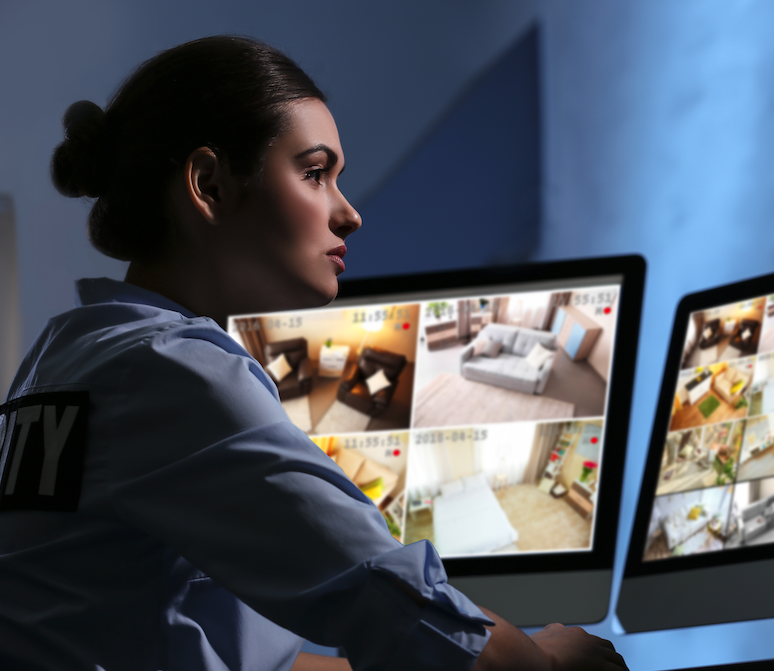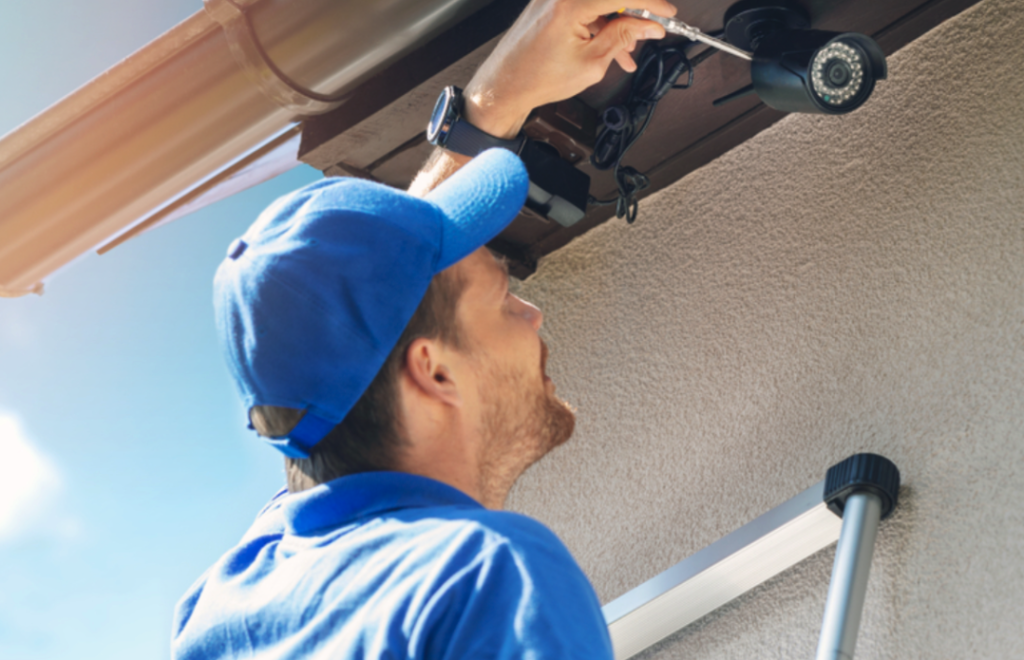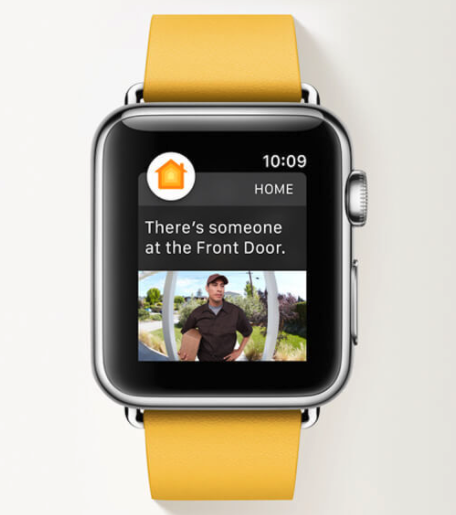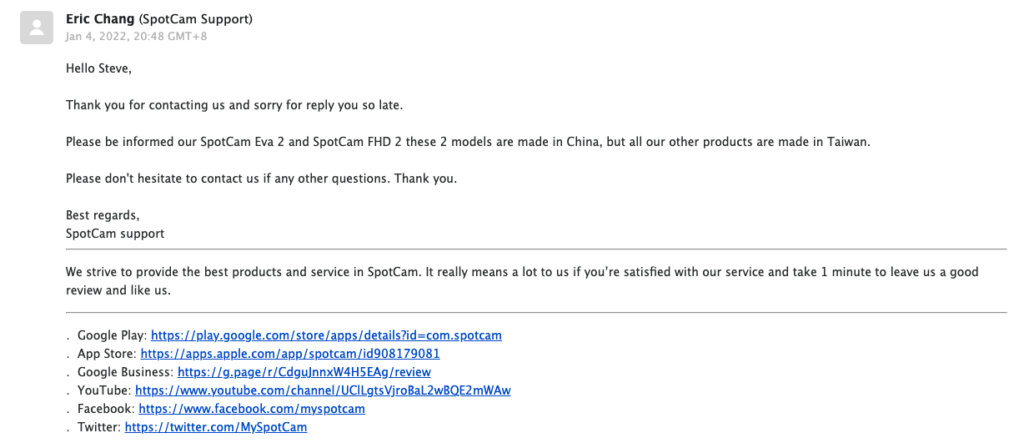About Security Cameras
Not so long ago, only big corporate offices and places like parking garages and banks could afford security cameras. The Internet changed this, of course. Now, all you need is a camera that connects to the Internet, and you can protect your house against burglars, vandals, wild animals, and other unwanted guests. What used to cost hundreds of thousand of dollars can now by yours for only a few hundred dollars. Hooray, right?
Well, not really. Ironically, the very system you set up to protect yourself from a handful of your local neer-do-wells may be inadvertently inviting thousands and thousands of unsavory people from around the world, whether a hacker the next town over in his parent’s basement, or a government surveillance operations thousands of miles away.
Are Security Camera in China More Dangerous than ones made elsewhere?
My gut tells me that no, security cameras manufactured in China (at least by non-China brands) aren’t inherently more “dangerous” than others, at least when they’re not connected to the Internet. While it’s certainly possible to build software backdoors to allow superuser access, if the brand is a legitimate brand you’d hope that their engineers would be able to spot any attempts to inject malicious code into the product they deliver.
But the problem is, we just don’t know. We do know that the Chinese government loves to surveil its own population. In 2005, they created the ironically-named “Skynet”, a network of 20 million cameras aimed at monitoring the general public. Over the years, they improved their systems to include facial recognition technology, drones, social media monitoring, and crowdsourcing of surveillance through mobile phone cameras. By the end of this year, it’s estimated that the number of surveillance cameras will exceed 1 billion. According to the CCP, this is all in the name of fighting crime. But conveniently, cameras are placed in strategic places like Tibet, Xinjiang, and the homes of any dissident with any kind of reach. And of course, now that Hong Kong is under China’s control, all of this technology is getting built up there too.
So, imagine that you’re a camera manufacturer or a camera brand like Eufy (owned by the Chinese company Anker). By law, you have a member of the Chinese Communist Party on your executive team. Do you think privacy and security are important to them? And let’s say hypothetically that they were asked to build in some backdoor access so that the government could go in–for “emergencies” only, of course. Do you think China companies would argue?
Honestly, the only thing really giving us any kind of security is that most of us live pretty boring lives, so it’s not worth the time of a hacker or a government surveillance team to break down the relatively thin walls protecting us. So with any security camera system connected to the Internet, I’d suggest making sure you take these very basic precautions, but also educating yourself about more advanced techniques, like VPNs.
What security cameras are made in China that I should avoid?
But if for no reason other than additional peace of mind, I’d steer clear of every China brand, and even any China-manufactured cameras. Unfortunately this includes some of the biggest names in cameras, including Wyze, Amazon’s Ring, Anker/Eufy’s Blink, SimpliSafe, D-LInk, and Logitech. Stay especially clear of brands that store your user data on servers in China–these include brands like Eufy and EZVIZ.
I was pleasantly surprised to find several Arlo camera listed as being made in Vietnam, including the newest Arlo Pro 4 Spotlight Camera. At first I cynically thought this was just a move to save money on tariffs, but it does seem that Arlo is taking proactive steps to differentiate itself from all of its other competitors by explicitly avoiding China. Good for them. They’ll be at the top of the list below.
Other than that, I had to look at professional brands on Grainger to find other brands that didn’t manufacture in China. If you don’t mind the higher price tag, you’ll want to ask whoever is installing your security system to use these.
Bottom line, maybe the chances of the CCP deliberately slipping in some backdoor code to access your camera is slim. But putting all that aside, think about this. Anyone who buys a security camera from China is ultimately helping them dominate that market and funding future innovation and product development that will be used on China’s own people. If heaven forbid, if conflict were ever to break out between the US and China, imagine the strategic advantage China would have of being able to access millions of camera around the world. It’ll make George Orwell’s “telescreens” look laughably tame in comparison. Anyone who sees this as wild conspiracy theory would do best to study the history of the Chinese Communist Party dating back to 1949.
What is NDAA and does it mean anything?
NDAA stands for the National Defense Authorization Act. a bill that comes up every year in Congress. The specific provisions relevant to security cameras has been in effect since August 2020 and it regulates the use, procurement, and sale of certain brands of surveillance equipment to federal agencies. It’s a bit shocking that it took until 2019 for such a law to be written, but such is the glacier-like movement of the US government.
Specifically, the NDAA banned the use of a few specific China-basic manufacturers, including Huawei, ZTE, HikVision, Dahua, and Hytera. Specifically, no federal agency can use any equipment made by these companies, any equipment with components made by these companies, or any contractor that works with any of this equipment. The CCP, of course, cried foul and tried to stir up accusations of racism and jingoism. But what they were really crying foul over was that someone had cut off their eyes and ears to every US military base and federal agency.
However, notes that the provisions of the NDAA don’t ban all China-made equipment. So even if equipment passes NDAA compliance, it’s possible (actually probably) that it was made in China. So again, even if there are no security issues (or better put, no security issues that a government official noticed), purchases of this equipment will stlll go to fund the CCP. Ironically, some of this money will be poured into lobbyists for the banned companies so that they can convince (or bribe) the right US government officials to take them off the list.



Consumer Security Camera
As we’ve seen with many other product categories, low-end consumer equipment is difficult to find not made in China, and almost impossible to find made in the USA. Even worse, top American brands like Google and Amazon are pouring all of their manufacturing to China, ensuring that China manufacturers stay on top of the latest innovations and engineering.
1. Arlo Pro 4 Spotlight Camera
Arlo seems to be a bright beacon of hope. They were one of the pioneers of do-it-yourself home security cameras and from all indications, they appear to be pulling out of China from both a consumer and a manufactuer perspective. Here’s an official announcement on their site announcing the discontinuation of all Arlo services in China as of September 1, 2021.
Furthermore, they’re the #1 most highly rated security camera on Consumer Reports, and the #1 rated cordless security Camera on Wirecutter.
What’s a little strange is that in all my research, I can’t find any official announcement from Arlo themselves of WHY they’re putting out of China. Some have speculated that it’s because Arlo is being sued by China companies for–get this–patent infringement. This is of course laughable because China’s entire manufacturing base was built on intellectual property theft, and now the tables are turning with China companies suing the very companies they likely stole intellectual property from. And of course, China’s court system is completely stacked in those China companies’ favor.
But I’m hoping that Arlo, in their desire to enforce their Privacy Pledge, knows that any data that is hosted within China’s borders will be inherently insecure.
Arlo’s top-of-the-line product is their Arlo Pro 4 Spotlight Camera. I’d suggest buying directly from the source to make sure you’re getting the latest and most authentic product. But if you’re looking to save a little money, I’d suggest going with Amazon or Best Buy, as they typically have the best deals, especially around Black Friday. In my case, I bought my starter kit at Amazon that included three cameras, and as I expanded my network of cameras I bought new individual cameras at Best Buy. But to be completely sure you’re buying the latest and greatest, go to Arlo’s site directly.
Arlo cameras are great in that you don’t need a base station or hub to control them. Just mount the camera at strategic places inside and outside your house where you can monitor for any intruders, whether human or animal. The 2K video lets you see very detailed images, even to the point of being able to identify faces and license plates. Night vision lets you see when things are completely dark. These camera have come a long way since they were first introduced–they have a wide 160 degree viewing angle lens which makes it perfect for keeping an eye on medium to large spaces. You can even speak through the camera using clear, two-way audio. It works with Amazon Echo Show and other smart home devices, so you can use your voice commands to view the cameras.
2. Google Nest
I was a bit surprised to see USA listed as the country of origin on Nest’s security camera listing on Amazon, especially since Google outsources so much of its hardware production, such as its Pexel phones, to China.
But Google Nest appears to be running largely autonomously as a subsidiary of Google since its acquisition in 2014. So even though these products have the Google name and logo, it looks like they don’t take their marching orders from the same people who make other Google-branded products. That’s a great thing.
I’m a little skeptical that Nest is really made in the USA, but at the very least all indications are that since the 2018 tariffs, they’ve been moving their production to Taiwan and Malaysia. I haven’t seen any updates on their progress since 2019, but according to sightings “in the wild” on Amazon and Reddit, since 2020 Nest products bought in Amazon are made in Thailand.
Nest seems to be a product that shifted manufacturing out of China for economic reasons rather than out of principle, so check the label carefully before buying and keep an eye on them that they don’t rush back to China if the US decides to ease tariffs (which hopefully it won’t). Personally, I’d choose to reward a brand that stands on principle like Arlo, but if you run other Google products, you’ll probably get better compatibility and support from these.
3. SpotCam
SpotCam boldly says in their Amazon product listing that they are “a Taiwanese brand made in Taiwan”. If that were 100% with no shenanigans they’d be #1 on this list.
Unfortunately, as I dug deeper, I found some questionable things. A number of their Amazon product listings had comments from reviewers complaining that their boxes said Made in China on the box.
I contacted them and here’s the reply I got:

It’s very subtle, but if you see the phrase “SpotCam is a Taiwanese brand and made in Taiwan, NOT China” buried in the product copy OR the phrase “NOT Made in China” in the Product Title, it’s safe to assume these are made in Taiwan. It’s these that I’ll recommend:
SpotCam Sense Pro – Outdoor – $169.00 – This is a cool home security camera for outdoor use that has night vision, motion detection, and even sensors that measure temperature, humidity, and light levels.
SpotCam Sense Pro – Indoor – $139.00 – Same features, but made for Indoor use.
SpotCam FHD (not FHD 2) – $47.20 – Their basic 1080p home security camera, with night vision, two-way talk, motion and sound alert, and alarm siren.
SpotCam Pano 2 Wireless – $49.00 – A 1080p home security camera with all the above features and panoramic view.
Note in the same product listing, the “1080P Indoor Upgraded” and “1080P Pan/Tilt” are FHD 2 cameras and thus made in China. I think SpotCam is a little disingenuous when it changes its product copy for these items to read “SpotCam is a Taiwanese brand and software is developed in Taiwan, NOT in China”. While it’s technically correct, it’s misleading to people who are browsing through all the products and seeing slightly different copy on the made in Taiwan models. Just come out and say “Made in China” or “Made in Taiwan” and stop playing games.
I’m also disturbed that they’ve chosen to outsource all their most recent models to China. Does that mean that they will plan on moving production for everything there? Again, the lack of transparency is disturbing.
Having said that, as long as there are models made in Taiwan that we can confidently identify as made in Taiwan, I’ll recommend them. And it’s true that one of the most important things is that the software and the cloud storage NOT be based in China, and that’s true for all of SpotCam’s products regardless of where they’re made.
4. Axis Communications
Axis is a company that I was really, really torn about putting on this list. They’re a company based in Sweden and one of the industry’s leaders. In 2018 Axis committed that any product not is not being sold in the China market will NOT be manufactured in China, and would never even used products sourced from China. Most reports I see since 2018 of products being bought in the EU or the US confirm that their products are made in either Thailand or Sweden, so it appears that they’ve remained true to their commitment. As such, any Axis camera you buy from a seller authorized to sell in the US and the EU is probably “safe” (but always call ahead and ask them to read the label to you to make sure).
Here’s where it gets sticky. Because Axis cameras are such high quality, one of their biggest customers is the Chinese Communist Party. Amnesty International released a report singling out Axis as one of the leading suppliers to the CCP as it builds out its surveillance state, especially to monitor its potential political enemies, dissidents, and groups slated for oppression and extermination. To its credit, Axis wrote a response that was fairly transparent, if not completely honest with itself (for example, they claim that their individual cameras could not be used to build a “surveillance state” because they don’t support facial recognition–but obviously they can be used as part of such as system).
Here’s the thing. I don’t begrudge Axis for selling its products to China. It would be nice if Axis did a better job of helping to expose and call attention to ways their products are being used to subvert human rights for the people in China, but ultimately that’s the job of our governments and our media, which both have been completely incompetent in doing so–inventing their own enemies to attack rather than focusing on the true enemies.
Another problem is that even though Axis doesn’t manufacture any products designated for the US or the EU in China, third party sellers can easily procure units made in China for resale to these markets. That’s why on certain Amazon product listings from third party sellers you’ll see China as the Country of Origin. That’s why it’s important to deal with authorized sellers like B&H Photo for products like this instead of the same model number on Amazon.
In fact, I’d suggest going with B&H to check out their entire line of Axis products rather than Amazon.
Business Security Cameras
These are higher-end (and higher priced) camera that you’ll want to consider if you have a bigger budget to spend. If you hire security contractors to set up your security system, you’ll want to tell them to buy one of these cameras, as they’re likely going to choose cheaper China-made cameras in order to give you a low bid.
Avoid these brands that are all-in on China: Vitek, Vision, Swann, LTS. Bosch, Invid/Paramont.
1. Speco Technologies
Grainger reports that these professional-grade cameras from Speco Technologies are made in South Korea.
There are two camera types, one a dome camera that you can mount to a ceiling or wall, and another a bullet camera that you can mount in a corner.
Both produce 2 megapixel resolution, or HD (1920 x 1080) quality. That’s good enough for most indoor applications. At around $300 each they’re both not wildly more expensive than consumer-grade cameras, and you definitely get what you pay for.
I put links to Grainger because they’re transparent about Country of Origin, but if you’d rather buy from a consumer retailer, B&H Photo and Video sells a wide line of Speco camera. They don’t disclose Country of Origin, so be sure to contact someone via their chat to confirm where it’s made before you buy.
2. Vivotek
VIVOTEK makes the bold move of communicating on their Web site that all their devices are made in Taiwan. They offer a wide range of products, all of which are aimed towards the professional installer market.
This fixed dome camera is one of their more popular models. At $139.99, it’s actually very much within the reach of a consumer budget. Check out B&H Photo World for a fairly well-organized list of cameras, accessories, and mounting hardware that VIVOTEK offers.
3. Acti
Acti is another Taiwan company that states outright that their cameras are made in Taiwan, Japan, and the United States. You can find their products on B&H Photo World as well.
Do you know of other security cameras not made in China worthy of mention here? Let us know in the comments!
- Tags:
- security cameras

Nice article!
Very good to read that Arlo is withdrawing from China. And that the import duties introduced by Trump do have an effect!
I’ve read a warning about unsafe Chinese cameras before. This mainly concerns the cameras with software from CamHi, from the Chinese manufacturer HiChip.
Consumers can easily be hacked, hackers can change passwords, turn off the camera or gain access to other devices in the network.
A few other options:
Mobotix, made in Germany.
https://www.youtube.com/watch?v=tbzxXd8KqVo
AV Costar, made in USA (not all models)
https://arecontvision.com/made-in-america
You also mentioned Vision as a made in China camera, do you mean Visionhitech?
This brand offers made in Korea models, see the link below to their 4 factories.
http://visionhitechsecurity.com/about-visionhitech/location/
I’ve been looking this USA based company for cams – https://nightowlsp.com/
Great article too.
Thanks Mike. I checked out this site and am disappointed that they do not come out and say where their products are made–they only say that they are “manufactured abroad” and it’s nearly impossible to see a straight answer–some people on Amazon and Best Buy insist they’re made in China, others say they’re made in Taiwan.
If Night Owl cameras are made in Taiwan, I’m perplexed as to why they’re not shouting it from the rooftops.
Can you confirm one way or another? Thanks!
When you go to that website for night owl that Mike posted scroll down to the Night Owl Advantage.
It says “Designed & Engineered in the U.S.A.” which after you’ve been doing this as long as I have might as well say “Not Manufactured in the U.S.A.”
If anyone from Night Owl is reading this and would like to comment, I’ll be happy to give them a lot more real estate on this page. Just bear in mind that readers on this site (and increasingly, customers in the US) are growing wise to weasel words like “manufactured abroad”.
Hi Mike, it seems that Eufy have updated their privacy page late last year to be BSI/ISO compliant. Keen to hear your thoughts on whether we can now have trust in the company after these accreditations?
Night Owl cameras are most certainly made in China. In fact, now you can not purchase a Night Owl system without being forced to sign on to connectivity to China servers for phone monitoring of your cameras as the video is kept on their servers. You can not attach directly to the camera via IP. We reversed engineered the code within these cameras/DVRs and confirmed this. Upon power up the first thing the camera’s do is report to a web service in China. Do not buy Night Owl!
Hi Steve,
It seems that Eufy have updated their privacy page late last year to be BSI/ISO compliant. Keen to hear your thoughts on whether we can now have trust in the company after these accreditations?
BSI/ISO compliance relates to the standards that they adhere to either in manufacturing or if it is ISO27001 then information security governance – nothing to do with location of manufacture
Great article, but considering that you have Speco as #1 for business-grade cameras I am compelled to post this direct response I got from a Speco rep when inquiring about the country of origin for the products he recommended:
“Those products below are made in China but do not contain any components from the NDAA banned list, furthermore, they were tested by UL and received UL 2900 which is one of the highest certifications for cybersecurity if that’s the concern.
Regarding TAA, the product must be made 50% or more in countries which are TAA such as Korea however they can still have components from China including non-NDAA items thus it only regulates where the product was assembled.
Speco is an American based company however we utilize the pacific rim to build some of our products for many reasons, ensuring however those items will pass rigorous cybersecurity testing and work with our servers which are located here in the USA, none of our products phone or ping to any servers outside the US regardless of where they were made.
Please note our cameras are NOT made in the US, I’m not sure if there are any camera manufacturers who are exclusively made in America, at least from any of the competitors I’ve come across. We do have some cameras which are TAA compliant made in Korea; however, those are not UL certified for cybersecurity and lack some features which were also a must so I compiled the best match for what you were looking for.”
Seems to me that all these greedy companies have sold out to some extent or another… so frustrating. And I can confirm that Vitek has completely sold out to China as well, after speaking with them directly.
This whole thing is confusing 2 a regular joe as myself. Geez im tiered already. I just want a good camera system that i can monitor and not worry about anyone hacking in 2 watch me walk around my house in the buff. No one is open and honest thz days.
You ALL missed the point — security! not who and where is it made!
Any product — NDAA or otherwise, if it espionage on users on behalf of China, or violating privacy choices user may so choose, is to be avoided, exposed。
Do not trust government, any government! Trust only ourselves.
In fact,, Chinese software engineers are doing a much better job.
Some espionage.
Some expose espionage!
Case in point, they exposed some Chinese TVs deliberately embedded codes reporting viewer activity and its reachable neighbors, to a specific government backed server station, every 10 minutes!
After the exposure, the TV manufacturer admitted and pledged to disconnect to the data collecting center.
We have talk too much, but did little. Shame!
Arlo are not functional as security cameras….
I bought two Arlo Essentials to monitor a home production machine, but the PC browser app requires me to re-sign in every 30 minutes. Hit reload or wake computer from sleep? Sign in again! And a sloooow connection to server.
Received them today, immediately return. No way am I doing that 10-20 times a day. No option to make the browser window remember me, making it completely non-functional for any security or monitoring applications. Unfortunately, Amazon Ring seem to have the same problem – made in China, but at least not using Chinese servers.
Unsafe world looking for a safe heaven and now face to face with unsafe security protective devices! Only Jesus can save and the earlier we realise this, the better!
Arlo cameras being made in Vietnam (is cloud hosted in Vietnam?) does not mean it’s good. Vietnam is a communist country that is in bed with CCP. Vietnam is not much better than China and if you security concerns are high, I would not go with this brand.
Taiwan made SpotCam seems interesting, but there is a high risk of Taiwan slowly being taken over by China similar to how Hong Kong was, so I would have a backup plan. It seems there is a gap in the market.
Was a great read. I was looking specifically for alternatives. Thanks for posting your research.
Turns out that the Arlo cameras are not immune to the Chinese government. I bought two (2) Arlo Pro 4 Spotlight cameras, one (1) Essential wire-free video doorbell, and one (1) Pro Smart Hub. The camera batteries are “assembled” in Taiwan but made in China. Very, very disappointed. If I knew that they were actually made in China, I would’ve not bought them.
The smart hub is made in Vietnam. The cameras and doorbell are made in Vietnam or Thailand according to their packages/labels but I cannot help but wonder if they too are actually made in China and just “assembled” in Vietnam/Thailand/Taiwan.
Thanks for the report. Sadly, China has all but monopolized the manufacturing of cheap electronic components.
As long as huge companies like Apple create complex supply chains that rely on China, every other manufacturer must follow. Even if a company wanted to source components from another country, it couldn’t.
China’s plan all along was to start by dominating the little things that no one cared about, and then once they dominated those, to parlay their dominance in to monopolizing “higher order” products. That was their plan all along, and American companies and its government fell for it, hook, line, and sinker.
While we can’t really avoid products that have some made-in-China components, what we must do is avoid the “obvious” problematic products altogether. Buying something “assembled” in the USA, Vietnam, or Taiwan is a start.
The next thing we all must do is expose how compromised the supply chain really is. Right now, all of this information is buried behind NDAs, but from time to time we see people exposing it, from 90% of synthetic Vitamin C to Xinjiang cotton.
The most important thing is that we need to wake up our fellow citizens to care, and hopefully it won’t be at the point where missiles are in the air to Taiwan or Los Angeles.
I am partly in agreement with Robert Fairchild comment above (Oct. 21, 2022). The point is not where the wireless cameras were manufactured (it makes sense for companies to have their cameras produced abroad to present an affordable product to Western customers). The critical part, I think, is the owner and location of the server that runs the application sending the image or video to the customer phone or computer.
Good read. thanks. Wish I came across your website a few years ago.
About 2 years ago, went to a local electronics store. They advised me to get a security camera from Hikvision, unfortunately all in store were made in China.
Got it home and started setting it up…. what was strange is the amount of info Hikvision wanted to know about me.
Did some investigation and found it was Chinese State owend.
Also came accross recently this article from Australia, where the government has been urged to rip out cameras and security gear made by Hikvision and Dahua in the wake of them being banned in the United States and United Kingdom due to fears they may contain spyware.
I now bought an Arlo security camera set. Must say, very happy with it.
https://www.abc.net.au/news/2023-02-09/chinese-government-linked-cameras-found-in-government-buildings/101950236